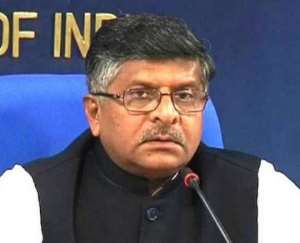
Accra, Sept. 19 - (DPA/GNA) - The Indian government approved an ordinance on Wednesday that makes the controversial practice of instant divorce practiced by some members of the Muslim community a criminal offence.
Federal Law Minister Ravi Shankar Prasad said that despite the Supreme Court ruling the practice of "triple talaq" unconstitutional last year, it continued unabated. "We felt there was a compelling urgency to pass the ordinance," said Prasad.
India has so far been one of the few countries where a Muslim man could divorce his wife by saying the word "talaq" - "divorce" in Arabic - three times in quick succession.
Prasad said that of the 430 cases of triple talaq that had come to the government's attention between January 2017 and September 2018, 239 occurred before the court judgement and 201 afterwards.
Women are given the instant divorce on flimsy grounds, such as burning bread or getting up late, Prasad said. Critics of the practice say it leaves women destitute and robs them of basic rights.
A new law that makes triple talaq a criminal offence punishable with up to three years in jail has been passed by the lower house of parliament and is pending in the upper house, where the ruling Bharatiya Janata Party (BJP) does not have a majority.
An ordinance is valid for six months, after which it has to be approved by both houses of parliament.
The ordinance has tweaked a few provisions in the bill in response to concerns, Prasad said. Unlike in the bill, where anyone can make a complaint, only a relation through blood or marriage can file a police complaint under the ordinance.
The ordinance also includes a provision for immediate bail, but only with the wife's consent, Prasad said. Critics had pointed out that if the main breadwinner is jailed, it may pose a problem for the family.
There is also a provision to work out a compromise, but only with the wife's consent.
Muslims in India, accounting for some 14 per cent of a population of 1.25 billion, are governed by personal law, which is loosely based on sharia.
"This should have been done many years ago, it is a positive development," said Zakia Soman, one of the petitioners before the Supreme Court.
Some opposition parties want lesser sentence for the convicted, while others have said that to criminalize a social practice is wrong.
Prasad accused opposition parties of failing to end an "arbitrary and unconstitutional practice" because of pure vote bank politics.
The All India Muslim Personal Law Board and other institutions have opposed legislation, saying that once the Supreme Court struck down the practice, it should be left to the community to change their ways.
The Hindu nationalist BJP is hoping to get the votes of Muslim women through this political gimmick, said lawyer and lawmaker Majeed Memon.
General elections are scheduled in 2019.




 This IMANI job no dey pap; the people you are fighting for are always fighting y...
This IMANI job no dey pap; the people you are fighting for are always fighting y...
 Prof. Naana Opoku-Agyemang has changed; you can see a certain sense of urgency –...
Prof. Naana Opoku-Agyemang has changed; you can see a certain sense of urgency –...
 MFWA Executive Director slams Akoma FM for engaging in ‘irresponsible’ media pra...
MFWA Executive Director slams Akoma FM for engaging in ‘irresponsible’ media pra...
 ‘Women must become millionaires too’ — Prof Jane Naana on establishment of Women...
‘Women must become millionaires too’ — Prof Jane Naana on establishment of Women...
 Some believe only in Ghanaian votes, not Ghana — Kofi Asare jabs politicians
Some believe only in Ghanaian votes, not Ghana — Kofi Asare jabs politicians
 Plan to make BEST sole aggregator of Sentuo Oil Refinery will create market chal...
Plan to make BEST sole aggregator of Sentuo Oil Refinery will create market chal...
 2024 elections: I can't have the man I removed from office as my successor — Aku...
2024 elections: I can't have the man I removed from office as my successor — Aku...
 2024 Elections: Immediate-past NPP Germany Branch Chairman garners massive votes...
2024 Elections: Immediate-past NPP Germany Branch Chairman garners massive votes...
 Gov’t focused on making Ghana energy self-sufficient, eco-friendly – Akufo-Addo
Gov’t focused on making Ghana energy self-sufficient, eco-friendly – Akufo-Addo
 April 25: Cedi sells at GHS13.74 to $1, GHS13.14 on BoG interbank
April 25: Cedi sells at GHS13.74 to $1, GHS13.14 on BoG interbank
